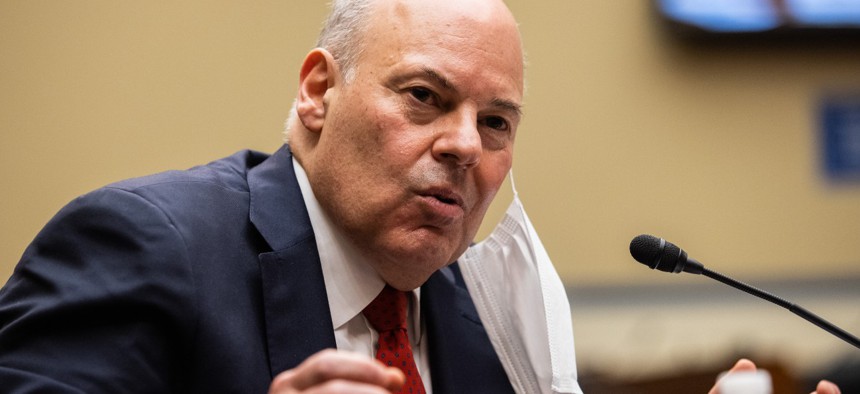
Postmaster General Louis DeJoy is not happy that some groups are once again seeking to block USPS from using its full authority to raise rates above inflation. Graeme Jennings-Pool/Getty Images
Louis DeJoy Laments the Existence of USPS' Regulator
The postmaster general jokes he would be better off without the regulatory commission, which exists to protect Americans from the Postal Service's monopoly.
The head of the U.S. Postal Service speculated this week that his organization would run better if it were not beholden to a regulator, expressing his frustrations during a Washington conference about the roadblocks inhibiting some of his desired reforms.
Postmaster General Louis DeJoy made the comments in a light-hearted manner, according to several people in attendance, though he was seriously lamenting the authority the Postal Regulatory Commission has to derail his plans. The commission sets the pricing system for USPS and must approve any rate increase postal management proposes, which drew DeJoy’s frustration during his remarks this week.
“Perhaps we’d be a lot better off if we didn’t have a PRC,” one attendee recalled DeJoy saying at the Mailers Technical Advisory Committee meeting.
While he laughed after making the suggestion, DeJoy’s comments caused those in the room to perk up and take notice. Several individuals said they had to confirm with other attendees that they had, in fact, heard him correctly. The Postal Service declined to provide audio of the remarks or to confirm exactly what DeJoy said.
The Postal Service operates with a statutorily protected monopoly on all mail. The Postal Regulatory Commission was established to ensure USPS, as a government entity, does not abuse that authority.
DeJoy was particularly frustrated during the conference because some groups are once again seeking to block USPS from using its full authority to raise rates above inflation. At issue is how to count the $57 billion in one-time savings postal management reported in 2022 as a result of the Postal Service Reform Act. If USPS is allowed to discount the savings, it will raise rates for normal, First-Class mail by around 5.3% in July. Otherwise, the increase would be around 4.3%. The Postal Service most recently increased its prices in January, bringing the price of a stamp to $0.63 as part of a 4.2% overall increase to First-Class mail rates.
Several groups are asking the regulatory commission to reconsider the pricing model in light of the measure that President Biden signed into law last year, accusing postal management of engaging in an “accounting sleight of hand.” The commission has yet to rule on that appeal, causing DeJoy to voice his irritation both with the commission and with the mailer groups that have stood in his way.
"Postmaster General DeJoy enjoyed the energetic interaction with the MTAC group," said Dave Partenheimer, a USPS spokesman. "He met with the MTAC leadership after his presentation, and they told him they appreciated his frankness."
Mark Fallon, a conference attendee and president of The Berkshire Company, a consultancy that advises businesses on print and mail operations, said DeJoy made his comments about the commission as part of a series of complaints that he “doesn’t have the freedom to do what he wants.”
Steve Kearney, executive director of the Alliance of Nonprofit Mailers, who was also at the conference, said DeJoy "was on a roll" as he listed off his grievances.
DeJoy previously requested everyone in the mailing community fall in line with his vision for reforming USPS.
“All stakeholders need to realize that each day lost in executing on our strategy will consume cash and eventually accumulate to a cash deficit that will necessitate more aggressive actions by us or the federal government,” DeJoy said at a Board of Governors meeting last year.
He is not the first postmaster general to grow exasperated with the regulatory commission's oversight. Under his predecessor Megan Brennan, USPS asked the regulator to give postal management unilateral authority to set its own rates. Despite its mail monopoly, USPS officials argued market constraints alone would prevent the agency from raising rates too high. The regulatory commission instead created a new system that allowed the Postal Service to raise its rates above inflation.
DeJoy reiterated at the conference that he has no plans to pare back his rate increases, which USPS has primarily been instituting twice per year. He did suggest he could eventually limit the hikes to once annually.
Asked to comment on DeJoy’s remarks, the PRC noted its mission is protected by statute.
“As always, the commission stands ready to serve the nation and carry out its role, as defined by law,” the agency said in a statement.
In a recent interview with Government Executive, DeJoy expressed his frustration that whenever he wants to implement a change, he gets “stopped to do a study, to do an evaluation.” The system, he said, is not set up to act with urgency he sees as necessary to meet the demands on his agency.
“That's why I'm here seven days a week, 15 hours a day,” DeJoy said, “because we are in a race against time.”







